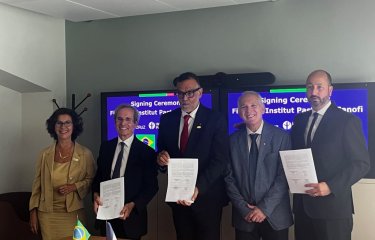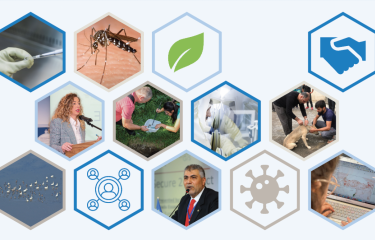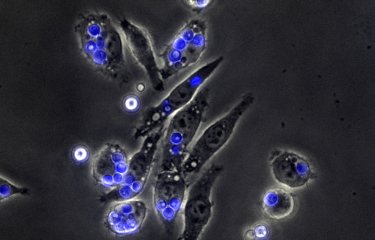Today, hepatitis B can be efficiently treated but the diagnosis tools to assess treatment eligibility are complex and their availability is scarce in Africa. To identify these patients, researchers from the Institut Pasteur in Paris and the Institut Pasteur de Dakar have developed a simple and efficient method that could easily be implemented in resource-limited countries.
In 2016, WHO set up an ambitious strategy to eliminate hepatitis B. It also set a global target of 80% antiviral therapy treatment coverage by 2030.
Patients with chronic hepatitis B can be diagnosed with a simple and inexpensive test that detects HBs antigen, a marker of infection. Three indexes are currently used to select among those patients the ones who are eligible for treatment: hepatic inflammation with a biochemical test, liver fibrosis with fibroscan and viral load with PCR. In many resource-limited countries, these costly methods, in particular PCR, are an obstacle to treatment programs implementation.
In an article published in the Journal of Hepatology, researchers from the Institut Pasteur Epidemiology of Emerging Diseases Unit in partnership with the Imperial College of London and the Institut Pasteur de Dakar built up a new score that simplify the identification of patients eligible for treatment.
Using a statistical model, the researchers selected among the diagnosis markers those that were significantly associated with treatment eligibility. Two markers were identified: the Hbe antigen (viral replication marker) and the alanine amino transferase (ALT) level, a biochemical marker.
"These two markers are easily accessible in every hospital in Africa. They were validated with independent data from cohorts of patients in Gambia, Senegal, Burkina Faso and African patients living in Europe" explains Dr. Yusuke Shimakawa from the Institut Pasteur Epidemiology of Emerging Diseases Unit.
With a sensitivity of 85% and a specificity of 77%, the performance of this new method to identify patients eligible for hepatitis B treatment is higher than the one currently recommended by WHO (90% and 40% respectively) .
The hepatitis B virus remains a major public health issue today. An estimated 257 million people are living with a hepatitis B virus infection worldwide.
Source
Development of a simple score based on HBeAg and ALT for selecting patients for HBV treatment in Africa, Journal of Hepatology, 2018.
Shimakawa Y1, Njie R2, Ndow G3, Vray M4, Mbaye PS5, Bonnard P6, Sombié R7, Nana J8, Leroy 8, Bottero J9, Ingiliz P10, Post G11, Sanneh B12, Baldeh I12, Suso P13, Ceesay A13, Jeng A13, Njai HF13, Nayagam S14, D'Alessandro U13, Chemin I15, Mendy M16, Thursz M14, Lemoine M17.
1Unité d'Épidémiologie des Maladies Émergentes, Institut Pasteur, Paris, France.
2The Gambia Hepatitis Intervention Study, IARC, c/o MRC Unit, Fajara, The Gambia.
3Medical Research Council (MRC) Unit, The Gambia at the London School of Hygiene and Tropical Medicine, The Gambia; Department of Surgery and Cancer, Liver Unit, Imperial College London, UK.
4Unité d'Épidémiologie des Maladies Émergentes, Institut Pasteur, Paris,France; Unité d'Épidémiologie des Maladies Infectieuses, Institut Pasteur de Dakar, Dakar, Senegal.
5Département d'Hépato-gastroentérologie, Hôpital Principal, Dakar, Senegal.
6Hôpital Tenon, Paris, France.
7Département d'Hépato-gastroentérologie, Centre Hospitalier Universitaire Yalgado Ouédraogo, Ouagadougou, Burkina Faso.
8Université Grenoble Alpes, Grenoble, France.
9Infectious Disease Department, St Antoine Hospital, AP-HP, Paris, France.
10Center for Infectiology, Berlin, Germany.
11Center for Infectiology, Berlin, Germany; Charité - Universitätsmedizin, Berlin, Berlin, Germany.
12National Public Health Laboratory, Banjul, The Gambia.
13Medical Research Council (MRC) Unit, The Gambia at the London School of Hygiene and Tropical Medicine, The Gambia.
14Department of Surgery and Cancer, Liver Unit, Imperial College London, UK.
15INSERM U1052, CNRS UMR5286, Centre de Recherche en Cancérologie, Université Claude Bernard, Lyon, France.
16International Agency for Research on Cancer (IARC), Lyon, France.
17Department of Surgery and Cancer, Liver Unit, Imperial College London, UK.





